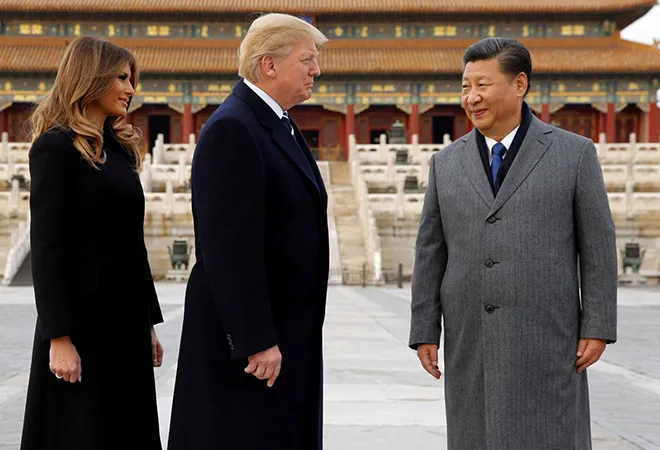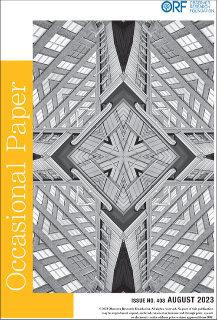
In the gathering confrontation between the United States and China, the Trump Administration has drawn a clear and hard line on trade. It should help crystallise issues, change the narrative and shake up the status quo crowd.
That his top economic advisers returned from Beijing with nothing except a promise for more talks throws the ball back to the White House. Will President Donald Trump stick to his hardline and act on the threat to impose tariffs of $150 billion in Chinese goods?
Trump’s team had a tough list of demands, including a cut in the trade deficit of at least $200 billion by 2020, an end to Chinese subsidies in advanced manufacturing, removal of non-tariff barriers, reduction of tariffs in non-critical sectors to US levels or below, respect for intellectual property, ending cyber attacks on US targets, improving access for investment and finally not retaliating against US farmers.
In essence, Trump is asking for a fundamental revision of how China conducts business. In other words, he has clarified the biggest conflict of today, the one between a liberal international order and an authoritarian, rules-flouting and closed system.
But the debate in western capitals is so coloured by a widespread contempt for Trump, it prevents an honest examination of what’s at stake. It must be acknowledged that no American president or a European leader for that matter has seriously challenged Beijing either on trade or geopolitical-military issues for the last two decades.
They have all retreated to the phony verbosity of “win-win” outcomes, agreed for endless talks, allowed their corporations to set policy and lost leverage over time while allowing China to dictate terms and subduing countries to bow down.
Norway, the biggest producer of salmon was shut out by China, the biggest consumer of seafood, after the 2010 Nobel prize was awarded to Chinese human rights activist, Liu Xiaobo, in Oslo. Then Norwegians made good, kowtowed some, refused to meet the Dalai Lama and the fish flowed.
What China has done to undermine Hong Kong’s autonomy despite a promise to honour the “one country, two systems” is blatant and shocking but there is barely a peep out of western capitals. China has scotched dissent and spirited away booksellers for stocking books critical of Chinese leadership.
But Chinese President Xi Jinping is portrayed as the new messiah of the open order when he pays lip service to globalisation at the Boao forum and Davos. The IMF has found China to be more closed than even emerging market economies. Visa and Mastercard are still not allowed to operate in China despite Beijing losing the case in 2012.
David Lipton, the IMF’s deputy managing director, called China out earlier this year. He said China should “look at its own restrictions on trade and investment” and distortions in industrial policy that favours state-owned enterprises. Lipton is a former Clinton and Obama Administration official, not a Trump partisan.
But China routinely ignores rulings by the World Trade Organisation and the International Court of Justice and brazenly justifies its violations of judgments. There is no evidence that international institutions have influence on the mechanics of Chinese policy making.
Trump, the great disrupter, has the gumption to confront the Chinese behemoth. He may have blundered or stumbled into taking China on, and done so haphazardly, but if there is one consistency in his thought process, it is his deep skepticism of China.
Many analysts make the mistake of seeing the wider conflict that Trump has clarified only in terms of technical disputes over specific products or industries. That’s a trap and it serves China well because it allows Beijing to take the U.S. down the dialogue hole. Nothing is actually resolved.
Meanwhile, the term of the American president runs out and a new chapter begins in Washington with a new policy review, new actors, new recommendations and new hope. The Chinese system with the Communist Party at the centre stays in position with all levers of power functioning.
What’s clear or should be, is China’s systemic behaviour and the need for real remedial measures. The Trump Administration, to its credit, took the first step to identify China as a rival in the two key national security documents.
The 2018 National Defense Strategy named China as the primary competitor, subtly implying that while Russia remains a challenge, it was not as worrisome as China.
The National Security Strategy, in fact, placed the competition with China across military, economic and political domains front and centre. The Trump administration’s NSS mentioned China 23 times, and labeled it a “revisionist” power -- a stark departure from the Obama Administration’s document, which talked about “the rise of a stable, peaceful, and prosperous China” becoming a responsible stakeholder in the international system.
The clear response is notable after eight years of a fluctuating non-response by the previous administration. It helped coalesce the thinking of the security establishment of both the Republicans and Democrats. The corporate world quietly gave its inputs.
Which raises the important question of costs. It’s a given that there will be costs – whether on soybean farmers or tech entrepreneurs or the disruption in supply chains. Will the American people be willing to pay more for consumer products or better still, consume less?
It might partly depend on how the issue is framed. The Trump Administration needs to set a different, more coherent narrative on the big fight as a conflict between two different orders. In the end that is what it is. Trump needs his base to walk with him as well as other constituencies, from labour unions to corporate leaders.
The bureaucracy in Washington is not geared to this new think on China and will resist change at every step. The State Department, now rejuvenated under Mike Pompeo as the new secretary, needs clear-eyed appointees in the China department not the advocates of continuity who downplay Beijing’s aggressions.
Trump’s unpredictability is a positive in pushing back China. Beijing can’t resort to old tricks of countering predictable moves with counter moves and then running down the clock. But Europeans need to join the fight because Beijing has the whole continent in its sights.
It’s too early to predict the outcome but Trump is trying to put the US back in the game.
The views expressed above belong to the author(s). ORF research and analyses now available on Telegram! Click here to access our curated content — blogs, longforms and interviews.



 In the gathering confrontation between the United States and China, the Trump Administration has drawn a clear and hard line on trade. It should help crystallise issues, change the narrative and shake up the status quo crowd.
That his top economic advisers returned from Beijing with nothing except a promise for more talks throws the ball back to the White House. Will President Donald Trump stick to his hardline and act on the threat to impose tariffs of $150 billion in Chinese goods?
Trump’s team had a tough list of demands, including a cut in the trade deficit of at least $200 billion by 2020, an end to Chinese subsidies in advanced manufacturing, removal of non-tariff barriers, reduction of tariffs in non-critical sectors to US levels or below, respect for intellectual property, ending cyber attacks on US targets, improving access for investment and finally not retaliating against US farmers.
In essence, Trump is asking for a fundamental revision of how China conducts business. In other words, he has clarified the biggest conflict of today, the one between a liberal international order and an authoritarian, rules-flouting and closed system.
But the debate in western capitals is so coloured by a widespread contempt for Trump, it prevents an honest examination of what’s at stake. It must be acknowledged that no American president or a European leader for that matter has seriously challenged Beijing either on trade or geopolitical-military issues for the last two decades.
They have all retreated to the phony verbosity of “win-win” outcomes, agreed for endless talks, allowed their corporations to set policy and lost leverage over time while allowing China to dictate terms and subduing countries to bow down.
Norway, the biggest producer of salmon was shut out by China, the biggest consumer of seafood, after the 2010 Nobel prize was awarded to Chinese human rights activist, Liu Xiaobo, in Oslo. Then Norwegians made good, kowtowed some, refused to meet the Dalai Lama and the fish flowed.
What China has done to undermine Hong Kong’s autonomy despite a promise to honour the “one country, two systems” is blatant and shocking but there is barely a peep out of western capitals. China has scotched dissent and spirited away booksellers for stocking books critical of Chinese leadership.
But Chinese President Xi Jinping is portrayed as the new messiah of the open order when he pays lip service to globalisation at the Boao forum and Davos. The IMF has found China to be more closed than even emerging market economies. Visa and Mastercard are still not allowed to operate in China despite Beijing losing the case in 2012.
David Lipton, the IMF’s deputy managing director, called China out earlier this year. He said China should “look at its own restrictions on trade and investment” and distortions in industrial policy that favours state-owned enterprises. Lipton is a former Clinton and Obama Administration official, not a Trump partisan.
But China routinely ignores rulings by the World Trade Organisation and the International Court of Justice and brazenly justifies its violations of judgments. There is no evidence that international institutions have influence on the mechanics of Chinese policy making.
Trump, the great disrupter, has the gumption to confront the Chinese behemoth. He may have blundered or stumbled into taking China on, and done so haphazardly, but if there is one consistency in his thought process, it is his deep skepticism of China.
Many analysts make the mistake of seeing the wider conflict that Trump has clarified only in terms of technical disputes over specific products or industries. That’s a trap and it serves China well because it allows Beijing to take the U.S. down the dialogue hole. Nothing is actually resolved.
Meanwhile, the term of the American president runs out and a new chapter begins in Washington with a new policy review, new actors, new recommendations and new hope. The Chinese system with the Communist Party at the centre stays in position with all levers of power functioning.
What’s clear or should be, is China’s systemic behaviour and the need for real remedial measures. The Trump Administration, to its credit, took the first step to identify China as a rival in the two key national security documents.
The 2018 National Defense Strategy named China as the primary competitor, subtly implying that while Russia remains a challenge, it was not as worrisome as China.
The National Security Strategy, in fact, placed the competition with China across military, economic and political domains front and centre. The Trump administration’s NSS mentioned China 23 times, and labeled it a “revisionist” power -- a stark departure from the Obama Administration’s document, which talked about “the rise of a stable, peaceful, and prosperous China” becoming a responsible stakeholder in the international system.
The clear response is notable after eight years of a fluctuating non-response by the previous administration. It helped coalesce the thinking of the security establishment of both the Republicans and Democrats. The corporate world quietly gave its inputs.
Which raises the important question of costs. It’s a given that there will be costs – whether on soybean farmers or tech entrepreneurs or the disruption in supply chains. Will the American people be willing to pay more for consumer products or better still, consume less?
It might partly depend on how the issue is framed. The Trump Administration needs to set a different, more coherent narrative on the big fight as a conflict between two different orders. In the end that is what it is. Trump needs his base to walk with him as well as other constituencies, from labour unions to corporate leaders.
The bureaucracy in Washington is not geared to this new think on China and will resist change at every step. The State Department, now rejuvenated under Mike Pompeo as the new secretary, needs clear-eyed appointees in the China department not the advocates of continuity who downplay Beijing’s aggressions.
Trump’s unpredictability is a positive in pushing back China. Beijing can’t resort to old tricks of countering predictable moves with counter moves and then running down the clock. But Europeans need to join the fight because Beijing has the whole continent in its sights.
It’s too early to predict the outcome but Trump is trying to put the US back in the game.
In the gathering confrontation between the United States and China, the Trump Administration has drawn a clear and hard line on trade. It should help crystallise issues, change the narrative and shake up the status quo crowd.
That his top economic advisers returned from Beijing with nothing except a promise for more talks throws the ball back to the White House. Will President Donald Trump stick to his hardline and act on the threat to impose tariffs of $150 billion in Chinese goods?
Trump’s team had a tough list of demands, including a cut in the trade deficit of at least $200 billion by 2020, an end to Chinese subsidies in advanced manufacturing, removal of non-tariff barriers, reduction of tariffs in non-critical sectors to US levels or below, respect for intellectual property, ending cyber attacks on US targets, improving access for investment and finally not retaliating against US farmers.
In essence, Trump is asking for a fundamental revision of how China conducts business. In other words, he has clarified the biggest conflict of today, the one between a liberal international order and an authoritarian, rules-flouting and closed system.
But the debate in western capitals is so coloured by a widespread contempt for Trump, it prevents an honest examination of what’s at stake. It must be acknowledged that no American president or a European leader for that matter has seriously challenged Beijing either on trade or geopolitical-military issues for the last two decades.
They have all retreated to the phony verbosity of “win-win” outcomes, agreed for endless talks, allowed their corporations to set policy and lost leverage over time while allowing China to dictate terms and subduing countries to bow down.
Norway, the biggest producer of salmon was shut out by China, the biggest consumer of seafood, after the 2010 Nobel prize was awarded to Chinese human rights activist, Liu Xiaobo, in Oslo. Then Norwegians made good, kowtowed some, refused to meet the Dalai Lama and the fish flowed.
What China has done to undermine Hong Kong’s autonomy despite a promise to honour the “one country, two systems” is blatant and shocking but there is barely a peep out of western capitals. China has scotched dissent and spirited away booksellers for stocking books critical of Chinese leadership.
But Chinese President Xi Jinping is portrayed as the new messiah of the open order when he pays lip service to globalisation at the Boao forum and Davos. The IMF has found China to be more closed than even emerging market economies. Visa and Mastercard are still not allowed to operate in China despite Beijing losing the case in 2012.
David Lipton, the IMF’s deputy managing director, called China out earlier this year. He said China should “look at its own restrictions on trade and investment” and distortions in industrial policy that favours state-owned enterprises. Lipton is a former Clinton and Obama Administration official, not a Trump partisan.
But China routinely ignores rulings by the World Trade Organisation and the International Court of Justice and brazenly justifies its violations of judgments. There is no evidence that international institutions have influence on the mechanics of Chinese policy making.
Trump, the great disrupter, has the gumption to confront the Chinese behemoth. He may have blundered or stumbled into taking China on, and done so haphazardly, but if there is one consistency in his thought process, it is his deep skepticism of China.
Many analysts make the mistake of seeing the wider conflict that Trump has clarified only in terms of technical disputes over specific products or industries. That’s a trap and it serves China well because it allows Beijing to take the U.S. down the dialogue hole. Nothing is actually resolved.
Meanwhile, the term of the American president runs out and a new chapter begins in Washington with a new policy review, new actors, new recommendations and new hope. The Chinese system with the Communist Party at the centre stays in position with all levers of power functioning.
What’s clear or should be, is China’s systemic behaviour and the need for real remedial measures. The Trump Administration, to its credit, took the first step to identify China as a rival in the two key national security documents.
The 2018 National Defense Strategy named China as the primary competitor, subtly implying that while Russia remains a challenge, it was not as worrisome as China.
The National Security Strategy, in fact, placed the competition with China across military, economic and political domains front and centre. The Trump administration’s NSS mentioned China 23 times, and labeled it a “revisionist” power -- a stark departure from the Obama Administration’s document, which talked about “the rise of a stable, peaceful, and prosperous China” becoming a responsible stakeholder in the international system.
The clear response is notable after eight years of a fluctuating non-response by the previous administration. It helped coalesce the thinking of the security establishment of both the Republicans and Democrats. The corporate world quietly gave its inputs.
Which raises the important question of costs. It’s a given that there will be costs – whether on soybean farmers or tech entrepreneurs or the disruption in supply chains. Will the American people be willing to pay more for consumer products or better still, consume less?
It might partly depend on how the issue is framed. The Trump Administration needs to set a different, more coherent narrative on the big fight as a conflict between two different orders. In the end that is what it is. Trump needs his base to walk with him as well as other constituencies, from labour unions to corporate leaders.
The bureaucracy in Washington is not geared to this new think on China and will resist change at every step. The State Department, now rejuvenated under Mike Pompeo as the new secretary, needs clear-eyed appointees in the China department not the advocates of continuity who downplay Beijing’s aggressions.
Trump’s unpredictability is a positive in pushing back China. Beijing can’t resort to old tricks of countering predictable moves with counter moves and then running down the clock. But Europeans need to join the fight because Beijing has the whole continent in its sights.
It’s too early to predict the outcome but Trump is trying to put the US back in the game.
 PREV
PREV


